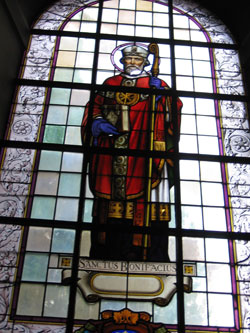
Feastday: February 19
Birth: 1183
Death: 1260
Bishop of Lausanne. He was born in Brussels, Belgium, and educated by the Cistercian nuns of La Cambra nearby. After studying in Paris, France, he taught dogma there and at Cologne, Germany. In 1230, he was made the bishop of Lausanne, Switzerland. He served nine years and then resigned to live at the Cistercian convent at La Cambra as chaplain because of an assault by agents of Emperor Frederick II after he had publicly scolded the emperor and the local clergy for their corruption.
Boniface of Brussels (1183 – 19 February 1260) was a Catholic prelate who served as the Bishop of Lausanne from circa 1231 until 1239 when he resigned after agents of Holy Roman Emperor Frederick II assaulted him. His relics are housed at the Kapellekerk and at La Cambre where he had died.
 Tomb.
Tomb.
Biography
Boniface was born in what is today Belgium in 1183 and in 1200 moved from home to go to Paris for his studies at the college there. Boniface taught dogma and became a popular lecturer. He was ordained to the priesthood while in France and from 1222 until 1229 taught at the college. But there soon became a bitter dispute between the teachers and students which prompted him to leave and find work elsewhere. He later taught until 1231 in Cologne at the cathedral school.
He became the Bishop of Lausanne in 1231 and was enthroned in his new see in March 1231 after receiving his episcopal consecration. He was enthusiastic about this appointment but was faced with corrupt priests which he condemned in a pulpit address while also singling out King Frederick II. The king sent his agents to attack Boniface who sustained serious injuries but managed to escape. He travelled to Rome and secured permission from a reluctant Pope Gregory IX to resign. The pope wanted to make him the bishop of another see though Boniface refused the offer.
In 1245 he attended the First Council of Lyon which Pope Innocent IV had convoked.
Boniface died in 1260; his coffin is small because it contains assorted vertebrae and pelvic bones rather than an actual skeleton.





